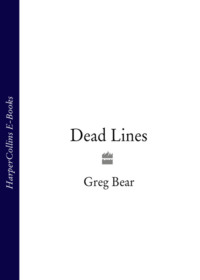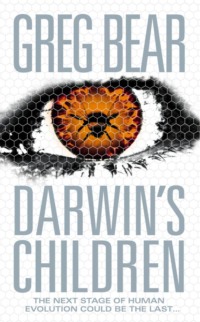
Полная версия
Vitals
‘We’re a mess,’ Nadia said. She climbed the ladder out of the well.
‘Dave went a little nuts down there,’ I said. ‘He tried to kill me.’
She gave me a level look at the top of the ladder. ‘How do you mean, nuts?’
‘He tried to sabotage the sub. Ripped out the control stick and used it to punch the sphere.’
‘Jesus,’ she said, but she didn’t sound surprised. Maybe she was in shock. She leaned against the bulkhead. ‘Dr Mauritz slipped a gun on board. He killed Thomas and Sylvia. Paul and Stan tackled him right here, where we’re standing. He’s tied up in the sick bay.’
I had spoken with Mauritz for a couple of hours the day before yesterday. ‘That’s stupid,’ was all I could manage to say. I looked around and saw dark red spatters on the deck and across the bulkhead under an emergency light. Blood dripped from the light cage. The sight knocked me off-balance and I groped with my outstretched hand to find a clean space on the wall.
Nadia grabbed a towel from a deserted lab, returned to the passageway wiping her face and hair, and threw me an odd, blameful look.
I felt like a Jonah.
‘I can’t find Max,’ she said, and tossed the towel back into the lab. We both heard the helicopter at the same time. She turned away with an exhausted slump of her shoulders, eyelids drooping, and said, ‘That’ll be the Coast Guard.’
‘Nadia, I have specimens,’ I called out to her as she wobbled up the ladders to the bridge.
‘Fuck the specimens,’ she shouted. ‘People died, Hal! Don’t you get it?’ She paused at the top and her red-rimmed eyes bored into me. ‘Mauritz was looking for you. He wanted to kill you.’
CHAPTER ELEVEN
A 250-foot Coast Guard cutter pulled up alongside the Sea Messenger. The Bell helicopter strapped onto the pad had carried two FBI agents. They were currently gathering evidence and interviewing Stan and Paul.
Dr Mauritz was hauled up on deck in a stretcher, past the crew mess, strapped down securely and talking a mile a minute, trying to explain that he was all right, they could let him go now. Mauritz was big-domed and balding. He had a kind of aristocratic English accent, and frankly he looked like a mad scientist. But he sounded apologetic and confused.
He had put up a stiff fight. Stan and Paul had banged him around hard. His head was covered with bandages.
I didn’t know how long the specimens would last in the sub. I knew they’d be kept pressurized and at the proper temperature for at least another four hours – unless something went wrong. I didn’t want to take that chance, but I also did not want to seem an insensitive asshole. The mood on the ship, understandably, was not good.
I waited in the crew mess, sipping a Diet Coke.
The Jonah feeling is indescribable. It’s about nothing you’ve done personally. It’s about a shadow hanging over you, an unshakable association with shit that no one understands. There I was, the closest thing to an outsider on the Sea Messenger, right in the bull’s-eye. Why would Mauritz want to shoot me? He hardly knew me. Why would Dave Press want to drown me and wreck the DSV? The DSV was everybody’s baby. Pilots would cross swords for the privilege of taking Mary’s Triumph down to the vents.
None of it pieced together. Without a rational explanation, even the smartest of scientists reverts to a tribal suspicion of bad juju.
Exhaustion slammed up against emotional shock. I couldn’t keep myself from shivering. Alone in the mess, waiting for the agents to work their way down the list and talk to me, I worried about the specimens.
Jason came in and stared at me. ‘You all right?’ he asked.
‘Fine.’
‘Owen called Captain Burke and asked about you. He said take care of you and your work. I moved your specimens over to the aquarium. They’re okay, I think.’
Unspoken, Jason was saying that what Montoya asked for, he got, even in the face of a police investigation. But Jason did not have to approve. ‘Owen knows about us, about the ship,’ he continued. ‘It’s on TV. You sure you’re all right?’
‘Thanks for moving them,’ I said, nodding like a fuzzy dog in a car’s rear window. I could have hugged him just for bringing good news.
‘What’d you find?’ he asked, and bit his lip, nodding along with me. We wobbled our heads, matching rhythm, and that was too weird. I stopped.
‘Xenos,’ I said.
‘Right. You were diving for xenos. Look like cnidarians to me, though. You sure you got what you were after? Dave grab them, or you?’
‘I used the suck tube,’ I said.
‘Do you know Dr Mauritz, off the ship?’ Jason asked.
‘No,’ I said.
‘Why did Dave go overboard?’
‘I don’t know,’ I said.
‘You didn’t hurt him and push him over, just to hide it? You didn’t fight, I mean, and hurt him. Self-defense?’
‘No. He did it all.’
‘Did he say he wanted to kill you?’
‘No, he just started…’ I sucked in my breath. ‘Trying to curse and not doing a very good job. Kind of funny, but scary, too. I better wait for the police. Don’t want this to seem rehearsed.’
‘Right,’ Jason said. He got up and stuck his hands in his pockets. ‘We found Max. He’s dead, too. Nadia’s severely shook.’
I just stared at him. ‘I’m really sorry,’ I said, as if it were all my fault.
‘Yeah.’
Jason left, and a tall man in a blue parka came in. He was forty or forty-five, dressed, beneath the unzipped parka, in a wool sweater and khaki cargo pants, damp with sea spray. He was an FBI agent out of the Seattle Bureau, he said. His name was Bakker and he asked a lot of questions, some of which did not make sense until I realized he didn’t know I had been on Mary’s Triumph when Mauritz flipped. As well, Agent Bakker had not been informed Dave Press was missing and presumed drowned.
The news seemed to confuse him, so he turned back his pages of notes and started over.
‘What in hell is a DSV?’ he asked.
By the end of the interview, I was ready to collapse. Bakker folded his notebook. None of the pieces fit for him, either. In his experience, scientists didn’t just go around killing each other.
After he left, I stretched out on the long, padded bench behind the main dining table and blacked out. I should have dreamed of falling through ink, this time without the bubble, drowning in endless, stinking night. Instead, I dreamed of being out in the desert, walking beside a guy with bushy white hair, wearing a long gray shirt.
CHAPTER TWELVE Seattle, Washington
The ship returned to the Port of Seattle the next morning and agents and Coast Guard investigators swarmed over her. Diligent men and women marched aboard and began stringing yellow tape and ribbon. A dozen agents with digital cameras and crime-lab kits took samples. We were instructed not to move anything, certainly not to remove anything.
Jason intervened with the agent in charge and he allowed Nadia and me to go down to the lab and check the specimens taken during the dive. We were accompanied by a young female agent, built a lot like Dave, I thought, her pant suit a size too small and stretched tight. She watched suspiciously from beneath a knit cap perched jauntily forward on neat cornrows, and asked a lot of questions.
She would not miss a trick, I judged.
Nadia did most of the talking. She had more color today, but her manner was cold and efficient, as if her emotions were running on a very low charge.
I was trying to figure out how to get my prizes off the Sea Messenger. The ship was likely to be impounded for days, and I had no idea what would happen to them over so much time. I just wanted to haul the containers off the Sea Messenger and get them over to the lab I was renting on southeast Lake Union. I was eager to get my critters stabilized in the proper inoculants, supplied with fresh seawater, and under reliable pressure.
Maybe it was a personal disconnect, like an emotional circuit breaker blowing, maybe it was shock. All I needed on this Earth, right now, was to document and describe the Vendobionts, if that’s what they were. Perform a few tests. Count their little fingers and toes.
It was not that I didn’t care about the rest. I just did not have a clue how I could help Nadia feel better, or do anything for Jason. I certainly did not feel responsible for what had happened, however strange the circumstances.
Maybe it was the Sea Messenger that was hexed.
I peered into my cabin. The plump agent in the too-tight suit stood there with two men in plain clothes – and I do mean plain, black suits and London Fogs.
My clothes, books, and computer were spread out on the bed, being violated.
‘Hello,’ I said.
The young agent had removed her cap and her cornrows were indeed perfect. She had the most intense and unreadable eyes, and the skin of her round face was an unblemished work of art.
‘We’re through with these,’ she said, and indicated the clothes on the bed. ‘But we’d like to keep these.’ She swung her hand – her whole upper body, as well – to indicate my computer and three textbooks.
‘The books are available on Amazon dot com,’ I said. ‘The computer contains private information. Unless you have a specific warrant, I’d like to take it with me. I’m not under suspicion, am I?’ I gathered up my few clothes and pointedly thrust them back into the travel bag, flopping over and pressing down sleeves and legs.
‘We need to establish relationships and circumstances,’ she said.
‘Am I a suspect?’
‘No,’ she admitted.
‘Do you have a warrant that lets you…’ I looked for the right legal words, then gave up. ‘Fumble through private documents?’
‘No,’ she said, eyes lidded with sublime nonchalance.
‘I’ll keep it neat and tidy, and I’m sure you’ll let me know if things change,’ I said, shaking a little at my presumption, and at hers. I tossed the computer and the books into the bag and zipped it shut.
I passed Nadia in the corridor as I rolled the bag on its wheels to the gangway. She was smoking a cigarette and looked dead on her feet. She glanced my way, then sharply looked aside and stubbed out her cigarette in a little can.
I had not seen her smoke before.
‘I won’t say it was a pleasure,’ she said.
I stopped and regarded her sadly, still buzzing from my anger in the cabin. I switched the bag handle to my right hand. ‘I feel like a goddamned Jonah,’ I said, and realized my eyes were watering. ‘Christ, what did I do?’
‘Nothing,’ Nadia said.
‘I have no idea why Dave went crazy in the sub, or why Mauritz wanted to kill me. I really don’t.’
She kept her face pointed toward the shadows and bleak gray concrete planes of the dock. I flashed on all the women who had ever stubbornly tried to put me aside or pigeonhole me, or blame me, with or without cause.
‘This is nuts,’ I said, and tugged my ridiculous little bag toward the gangway.
‘Betty Shun wants to talk with you,’ Nadia said, biting off the information like an insult. You’re being called to the principal’s office.
I looked back, eyes wide. She was lighting up another cigarette.
Our generation had taken up Dean Martin and Frank Sinatra, reading cheap paperbacks, wearing black suits, and smoking cigarettes, like all the war-weary lemmings of the nineteen fifties, but without their excuses.
I felt sick.
CHAPTER THIRTEEN
After a bad night’s sleep on the fourth floor of the Homeaway, just blocks from the Genetron Building and my rented lab, I opened the curtains. Across Lake Union, morning fog slid over the rusty tanks and pipes and broad lawn of Gasworks Park. I stood there for five minutes, feeling fortunate.
I was no Jonah. It wasn’t me that was hexed. I had survived, and that meant I was lucky, maybe even on the right track in this great scheme of things. Only the FBI and a couple of murders were in my way, and that pissed me off.
Rob would have recognized my mood instantly. Prince Hal was not getting his way.
A cell-phone rang on the nightstand. Data phones in the U.S. had been screwed up for weeks with viruses. I carried four with me, on four different systems, just to make sure: a PalmSec, an InfoBuddy, and two standard Nokias.
It was the PalmSec that was beeping. The pert little a.m. triple-tone told me two things, that I had a call, and that it was before noon. I flipped open the jacket, keyed in my unlock, and answered. ‘Cousins.’
‘Dr Cousins, Betty Shun. How are you?’
‘Dandy,’ I said, and regretted the flippancy.
‘We’re very sad here,’ she said. ‘We’ve lost a lot of friends.’
‘Yes. I know.’
‘We need to get together. I’ll bring along a man who also works for Owen. He wants to talk with you.’
‘When?’ I asked.
‘We’re in a car in front of your hotel. We’ll take you to the Crab Cart for breakfast.’
I had been given my marching orders. But I wanted to find out about my specimens. Time was running out.
As always.
CHAPTER FOURTEEN
Betty Shun stood in the lobby, dressed in a green-leather coat and green slacks. I turned and saw a blocky, balding man in his late forties push through the men’s room door, blowing on his hands. He made sure they were dry before he offered to shake.
‘Hal Cousins, this is Kelly Bloom,’ Betty introduced. Shun, Bloom, Press…I was seeing a pattern here, all members of the Monosyllabic Verb club. Bloom wore denim all over – denim pants, denim jacket with brass buttons, a blue-denim shirt. And Air Jordans, old but scrubbed clean.
‘Dr Cousins, first off, congratulations,’ Bloom said. ‘Let’s get out of here and go someplace quiet.’
They escorted me to the drive. I had expected a limousine or at the very least a BMW, but the car parked in front of the hotel lobby, beaded with rain and speckled with mud, was a mid-nineties Ford Taurus, conspicuously purple, with a dented right fender and scrape marks all along the driver’s side.
‘Yours?’ I asked Bloom. He grinned.
‘It’s going to be a long day, isn’t it?’ I asked Betty. She gave me a studied smile.
The Crab Cart was quiet and dark. In the back, under windows overlooking yachts at private moorings, the booths were separated by barriers of glass and wood. Betty ordered first, oatmeal and two eggs. Bloom had nothing, not even coffee, maintaining his ascetic posture. I ordered a bowl of Wheat Chex, toast, and a small crab omelet. Bloom smiled as I laced into my food. Betty ate half her oatmeal, both of her eggs, and patted her mouth fastidiously with the cloth napkin.
The questions began. Bloom spoke in a pillowy bass, with a gentle North Carolina accent. He kept his hands folded on the oak tabletop. ‘Do you know why anyone would want to kill you?’ he asked.
‘No,’ I said. ‘You’re a private investigator, aren’t you?’
‘We both work with Owen’s security detail,’ Betty answered. She cocked her head at my raised eyebrow. ‘Did you think I was window dressing?’ She laughed, a tinkling trill. ‘Owen can afford much prettier, just not much smarter, or more cautious.’
‘Okay,’ Bloom said. ‘You understand we aren’t trying to go around the police investigation, and that we have no authority? You don’t have to answer.’
‘Decent of you to warn me,’ I said. The corporate Seattle way – a shakedown without the hard edge.
‘We try,’ Bloom said. ‘Owen wants to understand what happened. You were down in the DSV with Dave Press during the shooting on the Sea Messenger. Did you think Press was acting funny?’
‘He was acting scary,’ I said. ‘Not in the least funny.’
‘What did he do?’
‘I told the police, he was trying to curse and not doing a very good job of it.’
‘Was he asking inappropriate questions?’
‘Yes,’ I said. ‘But that wasn’t so bad…I mean…’ I paused. ‘I never mentioned that to the police.’
Bloom shrugged. His shoulders strained at the denim jacket. ‘Did he talk about Mr Montoya?’
Bloom was new to Montoya’s staff, I guessed.
‘He asked how we’d met, like that. Nothing suspicious.’
‘He wondered what you were doing with Mr Montoya?’
‘He talked about my getting special privileges with regard to the dives, the submarine. Jealousy aboard the Sea Messenger.’
‘Jealousy involving Dr Mauritz?’
‘I suppose. But mostly it was just water cooler talk – you know.’
Bloom nodded, but he wasn’t satisfied. ‘Dr Mauritz did anonymous peer review on one of your scientific articles,’ he said. ‘He recommended it be rejected.’
‘I didn’t know that,’ I said. ‘But then, I wouldn’t, would I?’
‘Did he ever show any animosity?’
I heard it first as anonymosity. ‘Not to my face. He seemed pleasant, but we had very little contact.’
Betty Shun broke in. ‘This isn’t going anywhere. Dr Cousins, Owen had your specimens taken off the Sea Messenger and sent to your lab.’
‘You should have told me that right away,’ I said.
‘He made sure they were delivered to your postdocs and they’re being well taken care of.’
‘They’re in special pressurized containers,’ I said, my anger building. ‘They should have been transported in a powered van. We agreed, the specimens are incredibly delicate – the temperature down there makes their membranes –’
‘Everything was done according to your instructions,’ Shun said. ‘If you’d like, we’ll drive you over there.’
‘It’s just a short hike. I can go myself,’ I said through clenched teeth.
‘A car is faster,’ she said persuasively. ‘And Owen –’
‘Yes, yes. Owen wants a report.’
We drove to the old Genetron Building. It’s in a former power plant that was given a multimillion-dollar makeover when Genetron moved in. You can see the building, with its tall exhaust stacks, from the I-5 bridge. Genetron was sold to the Swiss-French pharmaceutical giant Novalis, which rented me lab space in the now-vacant facility for a good rate – and with guaranteed security.
The lobby was an expensive waste of blond wood and stainless-steel, with a cut-pile green carpet that matched Betty Shun’s leather jacket. A security guard checked my card and gave Shun and Bloom temporary passes. I showed them the way to the ground-floor lab, at the end of a long hall on the north end of the building.
‘Does he have to come along?’ I asked Shun, waving my hand at Bloom.
‘Yes.’
Bloom lifted his head as if sailing into a wind and winked at me.
‘The specimens may have been in poor condition,’ Betty said as we walked down the hall. ‘We could not tell if they were dead or alive. We did our best, at Owen’s request.’
‘Did Nadia or Jason help carry them over?’
‘No,’ Betty said. ‘Nadia is in police custody now.’
That took me completely by surprise. ‘Why?’
‘Under suspicion of tampering with the food on board the Sea Messenger.’
‘That’s stupid,’ I said.
‘We think so, too.’
‘Tampering how?’ Then I remembered the creamy pudding and its results. ‘Some of them ate a bad dessert, but –’
Bloom interrupted. ‘There was a lot of odd behavior on board the ship, from the very beginning of the cruise. Fights, arguments, irrational statements at odd moments.’
I had spent much of my time in my cabin. Not being very sociable – and having a lot of reading to catch up on.
‘Somebody could have put drugs in the food or water,’ Bloom concluded.
My lab filled two rooms, each about twenty feet square, connected by a white Dutch door. I had ordered special holding tanks for the specimens. Dan and Valerie, my two assistants, were pressurizing the tanks as we walked in.
Dan was a postdoc in oceanic microbiology, a tall, big-shouldered farmboy in appearance but a wizard with equipment. He looked up from the pressure gauge and gave me an unhappy shake of his head.
‘The specimens are pretty traumatized, Dr Cousins,’ he said.
I muttered under my breath.
Valerie stood back, arms folded across her bosom, hands gripping her shoulders, as if contemplating a relative’s coffin. ‘They look dead.’
I moved around Shun and Bloom and fluttered my hands for a moment, probably stuck my tongue between my teeth, trying to figure out where to begin. A steel box full of plastic tubes filled with foot-long core samples from our first and second dives was still on the loading cart. The metal tanks containing the specimens from the third dive had been stacked on the power bed and plugged in. They were still cold and seemed, at a quick glance through the fogged plastic panels, to be carrying Items of Interest.
Still, the damage was likely already done; how to minimize its effects?
‘These creatures didn’t look that alive to begin with,’ I suggested, hoping to break the tension and help Dan and Valerie relax. ‘They’re sedentary.’
Valerie shook her head again, tears welling. I wasn’t lying very effectively.
‘All the specimens are here,’ I said, checking the inventory. ‘In that small tank – the one that’s not at pressure – we have some shovel loads from the sediment that need to be analyzed. I doubt we grabbed any infaunal specimens intact, but we can preserve them and stain for cytoplasm and do some tube counts in the mud. Get some formalin and rose bengal.’
Dan and Valerie focused on the scoop samples and a couple of shallow cores. I wanted them out of the way while I either silently mourned or, less likely, breathed a sigh of relief.
I wiped the panels on the big steel transfer tanks and peered inside with a pocket flashlight. Straight from the briny deeps: shadowy masses that might have been clouds of sediment. Or ruined xenos. I knelt and squinted. Some forms were more than just fragments.
Shun stayed, but Bloom slipped out to answer a phone call.
I checked out the stats in the lab computer and made sure the necessary conditions were being met: water at 3.5 degrees Celsius, high oxygen, 36 percent salinity, metal sulfides in medium traces.
‘It’s at 250 atmospheres,’ Valerie said.
‘If we reduce the pressure, the xenos break down into slippery mush,’ I said to Betty Shun. ‘Their cell membranes – mostly lipids – melt like butter on a hot day. Deep down, where it’s cold and heavy, the membranes are gelid.’
I’d begun a culture of typical bacterial mats even before going out on the Sea Messenger, and now I harvested them from a container in the refrigerator and shot them with a plastic bottle straight into the pump chamber. I watched them spread in pale ribbons into the lab’s central refrigerated tank.
‘Very impressive,’ Betty Shun observed, laying a hand lightly on the big tank’s cold acrylic. ‘I notice you just dumped in the bacteria. Why?’
‘The bacteria adjust quickly. Their desaturase enzymes stop working under pressure, and that pumps up the unsaturated fatty acids in their cell walls, keeping them from getting too inflexible. Our larger specimens aren’t so adaptable.’
I asked Dan to help me connect the first transfer vessel to the big lab tank. We carried it to the worktable and connected it to the delivery chute, making sure the lock seals were tight. I checked the pressure – the vessel had lost about three atmospheres – and I dropped the pressure on the lab tank to match. Then I opened the inner doors and mixed the waters. Small chunks of sandy, dirty jelly floated past.
Like the man praying that the bottle falling through the liquor store bag was vermouth, not gin, I hoped these fragments were common xenos and not our fancy Vendobionts.
‘It’s soup,’ Dan said.
I looked accusingly at Shun. ‘I should have moved them myself.’ She did not react. No doubt she had dealt with personalities fiercer than mine.






